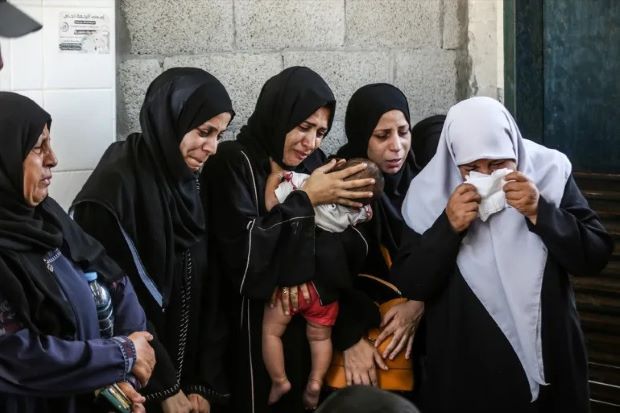New round of Gaza ceasefire talks to take place in Doha on Thursday
DOHA – Qatar will host Gaza ceasefire talks on Thursday (15), sources close to the negotiations said, seeking a so-far elusive agreement that the United States hopes would stop Iran striking Israel and avert a wider war.
US, Qatari and Egyptian mediators have invited Israel and Hamas for negotiations aimed at ending fighting that the health ministry in the Hamas-run Gaza Strip says has claimed nearly 40,000 lives in the Palestinian territory.
The talks will be held in the Qatari capital Doha, a source close to Hamas and a second source close to the negotiations said Wednesday, though it remained unclear if the Palestinian group – whose October 7 attack on Israel triggered the war – planned to participate.
According to a US source familiar with the Doha meeting, CIA director William Burns is scheduled to take part.
The office of Prime Minister Benjamin Netanyahu told AFP the heads of Israel’s Mossad spy agency and Shin Bet secret service would go to Doha.
On Tuesday (12), Netanyahu’s office detailed Israel’s conditions for a truce including “a veto on certain prisoners” being released from its jails.
Mediation efforts have repeatedly stalled since a week-long ceasefire in November — the only pause so far in the war — when dozens of hostages were released by militants in exchange for Palestinian prisoners held in Israeli jails.
A Hamas official said the Islamist movement was “continuing its consultations with the mediators”, after demanding the implementation of a three-phase proposal that US President Joe Biden laid out on May 31, instead of holding more talks.
US State Department spokesman Vedant Patel told reporters that “our Qatari partners have assured us that they are working to ensure that there is Hamas representation as well” in Doha.
The latest mediation push comes as regional tensions have soared following the July 31 killing of Hamas political leader and truce negotiator Ismail Haniyeh during a visit to Tehran.
Iran and its allies blamed Israel, which has not claimed responsibility for the attack that Tehran and armed groups it backs in the region have vowed to avenge, raising fears of a wider conflict more than 10 months into the Israel-Hamas war in Gaza.
Western leaders have urged Tehran to avoid attacking Israel over Haniyeh’s killing, which came hours after an Israeli strike in Beirut killed a senior commander of Hamas ally Hezbollah, the powerful Iran-backed militant group in Lebanon.
A truce deal in Gaza, based on “the framework agreement that’s on the table”, could help de-escalate regional tensions and “prevent an outbreak of a wider war”, said US envoy Amos Hochstein on a visit to Beirut on Wednesday.
Asked whether a ceasefire agreement in Gaza could stave off a feared Iranian attack on Israel, Biden said: “That’s my expectation”.
The US president added that while negotiations were “getting hard”, he was “not giving up”.
Iran rejects Western calls “to take no deterrent action against a regime which has violated its sovereignty and territorial integrity”, foreign ministry spokesman Nasser Kanani said, referring to Israel.
Iran’s mission to the United Nations said last week: “We hope that our response will be timed and conducted in a manner not to the detriment of the potential ceasefire” in Gaza.
In Israel’s commercial hub of Tel Aviv, flight attendant Avigail Ginzburg, 22, told AFP she was “very, very stressed about the (Iranian) retaliation”, but “no one knows what will happen”.
Israeli President Isaac Herzog said on social media platform X that the country remained on “high alert” over “the hate-filled threats of the Iranian regime and its terrorist proxies”.
The escalation has prompted governments to issue advisories against travel to Lebanon and also prepare contingency plans to evacuate their nationals from the region if full-scale war breaks out.
The United States has deployed an aircraft carrier strike group and a guided missile submarine to the region in support of Israel.
And the Biden administration approved more than $20 billion in new weapons sales to Israel on Tuesday, including 50 F-15 fighter jets.
Hamas’s October 7 attack on southern Israel resulted in the deaths of 1,198 people, mostly civilians, according to an AFP tally of Israeli official figures.
Militants also seized 251 people, 111 of whom are still held captive in Gaza, including 39 the military says are dead.
Israel’s retaliatory military offensive in Gaza has killed at least 39,965 people, according to the territory’s health ministry, which does not provide a breakdown of civilian and militant deaths.
The Israeli military said it carried out dozens of air strikes across Gaza in the past 24 hours while ground troops were engaged in “operational activity” in the southern city of Rafah.
Civil defence rescuers reported artillery shelling and air strikes across the Gaza Strip, with four family members killed in a residential complex near Khan Yunis.
With negotiators planning to meet, Palestinian Ibrahim Makhamer told AFP in central Gaza’s Deir al-Balah: “We hope for the end of the war.”
“We are all suffering,” said Makhamer, denouncing “a policy of starvation” and shortages of medical supplies in the territory, where the vast majority of its 2.4 million people have been displaced at least once by the war.
But Khaled Jaber, another Gazan, said his expectations for the Doha talks were “very low”.
“Every time Hamas agrees, Netanyahu comes out with impossible conditions,” he said.
Israeli government spokesman David Mencer insisted that “it is Hamas that continues to set additional terms and has refused to reach an agreement.”
-Agence France-Presse



Comments are closed, but trackbacks and pingbacks are open.